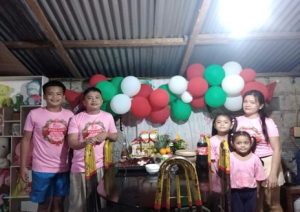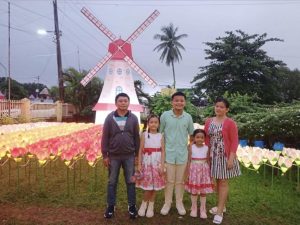It was a Thursday morning, and the sun was already scorching hot. Beads of sweat formed on my forehead as I struggled to carry the heavy visual materials needed for the Family Development Session. Just as I was about to hop onto the motorcycle, I was greeted by a cheerful, familiar voice. “Maaaaam, good morning! Tabangan na tika, Ma’am!”
With a bright smile and contagious energy, Ate Mary Ann, one of the parent leaders in Barangay Tayaga, rushed to my side to help. She eagerly walked ahead to inform the other beneficiaries of our arrival.

The session went on for a full two hours of lively discussion. As always, after the session, the parent leaders remained to help clean the area, arrange the chairs, and pack up the sound system. While I was checking the attendance sheets, Ate Mary Ann sat beside me, folding the tablecloth. What seemed like a routine day turned into a window into her story, one that moved me deeply.
The Libay family became Pantawid Pamilya beneficiaries in 2023 under Set 12A, registered in Barangay Tayaga. Before joining the program, Mary Ann described their life as a struggle between black and white—void of color, full of hardship. Both she and her husband Juniel came from poor households. With limited resources, their parents encouraged them to marry young rather than continue schooling. At just 18, Mary Ann became a wife, and at 19, a mother to her first son, Huebert.
They lived in a modest home made of light materials, nipa and amakan. Juniel worked as a fisherman, his earnings barely enough to make ends meet. When Mary Ann became pregnant with their second child, Mary Jeniel, who frequently fell ill as a baby, their situation became even more difficult. Mary Ann still wonders how her husband managed to provide for them during those trying times, standing strong as the family’s sole breadwinner.
As she recalled their early struggles, her youngest daughter, Jelah, ran up to her, sweaty and smiling, asking for water after playing. Mary Ann gently wiped the dirt and sweat from her daughter’s face, cautioning her to slow down. Her eyes softened with motherly love—a quiet reminder of her unending role as a parent. She shared with me her childhood dream: to become a teacher and speak fluent English. When I asked about her husband’s dreams, she laughed and said, “Dili man siya ganahan mo-eskwela, sige ra tog basketball og panguyab sa akoa.”
Now pregnant with their fourth child, Mary Ann hopes her children won’t have to marry young, like she did. With tears welling in her eyes, she said she wants them to finish school, chase their dreams, and grow into good, responsible people. She and Juniel are committed to providing the best they can, ensuring their children have a better life.

Their family has now been with the Pantawid Program for three years. Her children Huebert (14), Mary Jeniel (9), and Mary Jelah (7) are monitored and actively attending school. Two years ago, Mary Ann was elected as a parent leader for Set 12A in Barangay Tayaga. She shared how the program not only lessened the financial burden of raising a family but also gave her an outlet to express herself. Beyond the smiles and laughter she wears so well, she finds comfort in knowing she’s not alone, able to lean on fellow beneficiaries for support, or even just a listening ear.
Today, Mary Ann and Juniel’s life has slowly improved. With their practice of family planning, they’ve decided to stop after their fourth child. Juniel now owns a small boat, allowing him to earn more steadily as a fisherman. Their home, once made of nipa and amakan, is now a sturdier semi-concrete house, a symbol of progress and perseverance. Still, with small children to raise and ongoing challenges, the support from the Pantawid Pamilya Pilipino Program remains crucial to their journey.
Mary Ann’s story is like a book with chapters of growth: the introduction of her youth, the revelations of early marriage and hardship, the struggles of motherhood and poverty. But with each chapter, she grows stronger, learning, evolving, and striving not just for her own dreams, but for the brighter future of her children.

